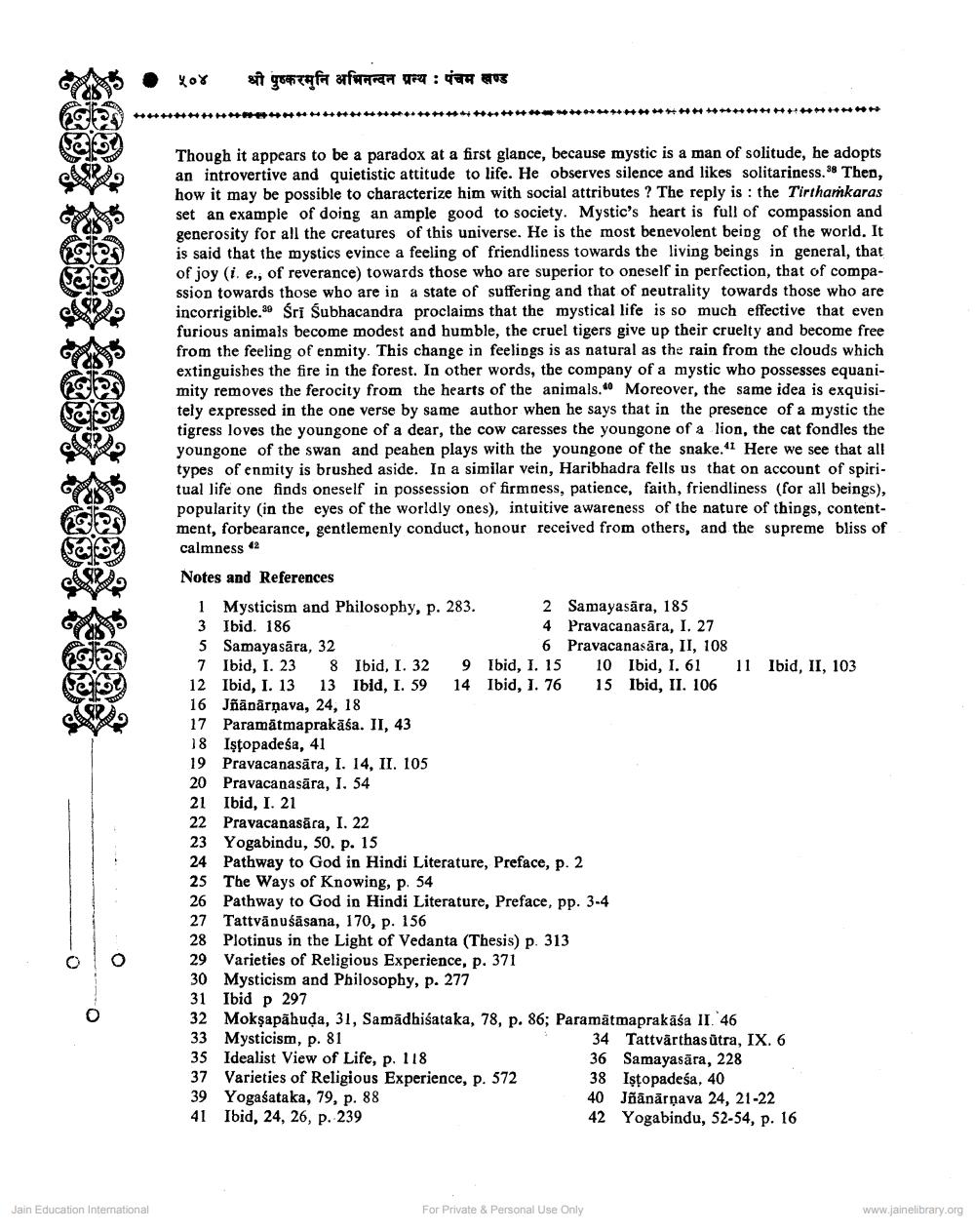________________
५०४
श्री पुष्करमुनि अभिनन्दन प्रन्थ : पंचम खण्ड
++++++++++++++
++++++++++++++++++
+++++++++++++++
+
+++++++
+++++++++
++++++++++++++++++
Though it appears to be a paradox at a first glance, because mystic is a man of solitude, he adopts an introvertive and quietistic attitude to life. He observes silence and likes solitariness. Then, how it may be possible to characterize him with social attributes ? The reply is : the Tirthamkaras set an example of doing an ample good to society. Mystic's heart is full of compassion and generosity for all the creatures of this universe. He is the most benevolent being of the world. It is said that the mystics evince a feeling of friendliness towards the living beings in general, that of joy (i. e., of reverance) towards those who are superior to oneself in perfection, that of compassion towards those who are in a state of suffering and that of neutrality towards those who are incorrigible.29 Sri Subhacandra proclaims that the mystical life is so much effective that even furious animals become modest and humble, the cruel tigers give up their cruelty and become free from the feeling of enmity. This change in feelings is as natural as the rain from the clouds which extinguishes the fire in the forest. In other words, the company of a mystic who possesses equanimity removes the ferocity from the hearts of the animals. Moreover, the same idea is exquisitely expressed in the one verse by same author when he says that in the presence of a mystic the tigress loves the youngone of a dear, the cow caresses the youngone of a lion, the cat fondles the youngone of the swan and peahen plays with the youngone of the snake." Here we see that all types of enmity is brushed aside. In a similar vein, Haribhadra fells us that on account of spiritual life one finds oneself in possession of firmness, patience, faith, friendliness (for all beings), popularity in the eyes of the worldly ones), intuitive awareness of the nature of things, contentment, forbearance, gentlemenly conduct, honour received from others, and the supreme bliss of calmness 2 Notes and References
1 Mysticism and Philosophy, p. 283. 2 Samayasära, 185 3 Ibid. 186
4 Pravacanasāra, I. 27 5 Samayasära, 32
6 Pravacanasära, II, 108 7 Ibid, I. 23 8 Ibid, I. 32 9 Ibid, I. 15 10 Ibid, I. 61 11 Ibid, II, 103 12 Ibid, I. 13 13 Ibid, I. 59 1 4 Ibid, 1. 76 15 Ibid, II. 106 16 Jñānārņava, 24, 18 17 Paramātmaprakāśa. II, 43 18 Iştopadeśa, 41 19 Pravacanasāra, I. 14. II. 105 20 Pravacanasāra, I. 54 21 Ibid, I. 21 22 Pravacanasāra, I. 22 23 Yogabindu, 50. p. 15 24 Pathway to God in Hindi Literature, Preface, p. 2 25 The Ways of Knowing, p. 54 26 Pathway to God in Hindi Literature, Preface, pp. 3-4 27 Tattvānušāsana, 170, p. 156 28 Plotinus in the Light of Vedanta (Thesis) p. 313 29 Varieties of Religious Experience, p. 371 30 Mysticism and Philosophy, p. 277 31 Ibid p 297 32 Mokşapähuda, 31, Samadhisataka, 78, p. 86; Paramätmaprakäsa II. 46 33 Mysticism, p. 81
34 Tattvärthas ütra, IX. 6 35 Idealist View of Life, p. 118
36 Samayasära, 228 37 Varieties of Religious Experience, p. 572
38 Istopadeśa, 40 39 Yogaśataka, 79, p. 88
40 Jñānārņava 24, 21-22 41 Ibid, 24, 26, p. 239
42 Yogabindu, 52-54, p. 16
Jain Education International
For Private & Personal Use Only
www.jainelibrary.org




